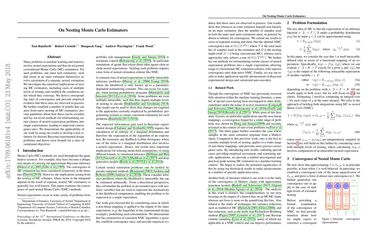On Nesting Monte Carlo Estimators
Many problems in machine learning and statistics involve nested expectations and thus do not permit conventional Monte Carlo (MC) estimation. For such problems, one must nest estimators, such that terms in an outer estimator themselves involve calculation of a separate, nested, estimation. We investigate the statistical implications of nesting MC estimators, including cases of multiple levels of nesting, and establish the conditions under which they converge. We derive corresponding rates of convergence and provide empirical evidence that these rates are observed in practice. We further establish a number of pitfalls that can arise from naive nesting of MC estimators, provide guidelines about how these can be avoided, and lay out novel methods for reformulating certain classes of nested expectation problems into single expectations, leading to improved convergence rates. We demonstrate the applicability of our work by using our results to develop a new estimator for discrete Bayesian experimental design problems and derive error bounds for a class of variational objectives.
PDF Abstract ICML 2018 PDF ICML 2018 Abstract
